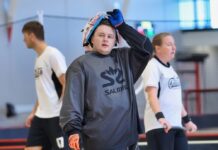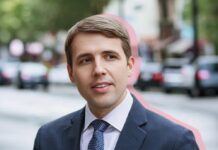Riverton man Teoti Jardine (80) lays bare the shock of discovering homophobia in his childhood and how he escaped to the other side of the world to feel safe and accepted.
I was born in Queenstown in 1944 and grew up on Kawarau Falls Sheep Station, which was my father’s family farm.
Growing up, I didn’t realise how sheltered and free I was.
I spent my spare time dancing and playing with dolls, and my parents and everyone around me accepted it. They accepted me just as I was, which led to a wonderful, supportive upbringing.
So when I enrolled at Southland Boys’ High School as a boarding student and became surrounded by homophobia and bullying, I quickly learnt I wasn’t “normal.”
In the 1940s and 1950s, Queenstown was a small town where everyone knew each other. It was a wonderful place to grow up. I knew from a very young age that I was interested in men rather than women. I remember, when I was about seven, I told my brother I wanted to kiss his friend Barry, and he told me not to be so ridiculous. I couldn’t understand why but thought, OK, there are some things I shouldn’t say.
When I was at the boarding school, there was a homosexual event publicised in the Southland Times, and homophobia became rife. I thought to myself, Oh, OK, that’s me. I had better hide who I am. That was the first time I had ever really felt that way. I had to bury who I was and play a game of not being myself.
The homophobia affected me so deeply that I started considering suicide. I became so angry that there was a law that basically said it was a crime for me to exist. I got so angry that I decided, actually, no, I wouldn’t kill myself. Instead, I would get as far away as I could from this country with this ridiculous law – where I could be who I am and feel safe.
So in 1965, I moved to Montreal, Canada. I quickly made friends who introduced me to drag shows, gay bars, and a safe way to live my life being who I was. I remember going to a drag queen event on Halloween on my first ever night at a gay bar, and my friend introduced me to someone and said, “This is straight George from New Zealand.”
I admitted to him that I wasn’t straight, and he said, “I knew you weren’t, you bitch.” That same night, I was dancing with a man who kissed me, and it just felt like a ton of bricks had lifted off my shoulders. It was extraordinary. I didn’t realise until then how much weight I was carrying – not being able to be myself.
From that point forward, I lived my life the way I wanted to. I joined a dance troupe, completed my psychiatric nursing training, studied pottery, joined the peace movement. I meditated daily, and eventually I met Arthur Weinstein (an interior designer from New York), and we fell in love.
In 1970, Arthur and I moved to Italy so we could concentrate on pottery. 18 months later, we moved to the United Kingdom, where we set up a pottery studio.
In 1972, I travelled home to New Zealand to spend time with my father after he suffered a major heart attack. It was such a blessing to have that time with him. I really got to know him during that time, and I realised that if I had told him I was a homosexual when I was younger and that I wanted to be a dancer, he would have done everything in his power to make that happen. I know that now.
He passed away shortly after, in 1973.
In 1977, my relationship with Arthur ended, but we remained good friends until his death in the early 90s.
One day, during meditation, one of my tupuna visited me. He had a complete tā moko and pounamu pendant hanging from his right earlobe. I could feel his strength coming into me, and it was like he was telling me I needed the strength and vigilance of a warrior. He awoke in me my taha Māori, and I knew I had to come home, and even though it took me seven years to do so, I returned home in 1984.
While staying with Mum in Invercargill, I saw an advertisement in the Southland Times inviting homosexual men and health professionals to a talk by Bruce Burnett about HIV /AIDS. We became good friends, and I became a member of the AIDS Network, which later became the AIDS Foundation and now The Bruce Burnett Foundation.
He was a lovely man, filled with energy to spread the information around safe sex practices. He lived with HIV, and it was an AIDS-related condition that took his life in June 1985.
While I was working at Timaru Hospital, I attended a Health Hui at Arowhenua Marae. After the Pōwhiri, I was talking to one of the whānau, who asked me about my whakapapa. When I told her, she said, “You’re one of us.” This was where the Tūpuna had called me to be.
I’ll always be grateful for the Arowhenua whānau who so generously stepped me into Te Ao Māori. I was with them for almost 30 years.
In 2018, I felt the call to come home to Murihiku, and so I rented a flat from the Ōraka Aparima Runaka.
At the Riverton Medical Centre one day, I asked the nurse what was happening for the LGBTQI+ whānau down here. She asked for my phone number, and I received a call and was told that the CHROMA LGBTQI+ Initiative for Southland held a drop-in session every second Tuesday in the library of Ngā Kete.
I went along and met these wonderful young people doing such a great job and enjoyed these sessions just being queer together. They invited me to become their Kaumātua, which I felt humbled and honoured to accept.
I have come completely full circle. I fled Murihiku so I could be myself, and now I am solidly being myself and supporting this group, which supports so many others. I feel honoured.
Recently, I was invited to speak at a Gay Pride event in Nelson. What an honour it was to be there and to share my thoughts. When young gay men come to me saying they would like to tell their parents but are feeling vulnerable about doing so, I tell them to wait until you are feeling strong about who you are. You can do that here in Aotearoa now, not go to the other side of the world like I had to. During my life, people have asked me what happened to make me queer, what’s wrong with me? What happened is that we are born, and we are who we are. Stand strong within yourself. Ngā mihi.
CHROMA, the LGBTQI+ initiative for Southland, is committed to providing social and community support, rainbow advocacy, and health promotion to our local LGBTQIA+ whānau and allies, running fortnightly coffee groups, monthly pizza and movie nights, two-monthly whānau support groups, and other events & activities. For more information, contact 0210 830 1694 or email chromasouthland@gmail.com























